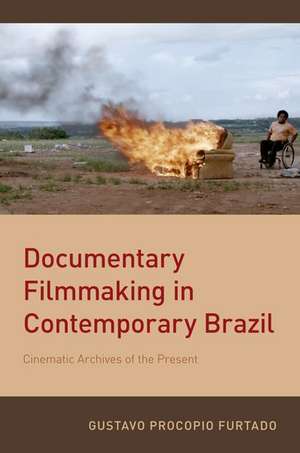Documentary Filmmaking in Contemporary Brazil: Cinematic Archives of the Present
Autor Gustavo Procopio Furtadoen Limba Engleză Paperback – 7 feb 2019
| Toate formatele și edițiile | Preț | Express |
|---|---|---|
| Paperback (1) | 306.94 lei 31-37 zile | +49.79 lei 10-14 zile |
| Oxford University Press – 7 feb 2019 | 306.94 lei 31-37 zile | +49.79 lei 10-14 zile |
| Hardback (1) | 588.37 lei 31-37 zile | |
| Oxford University Press – 24 ian 2019 | 588.37 lei 31-37 zile |
Preț: 306.94 lei
Preț vechi: 334.03 lei
-8% Nou
Puncte Express: 460
Preț estimativ în valută:
58.73€ • 61.49$ • 48.60£
58.73€ • 61.49$ • 48.60£
Carte tipărită la comandă
Livrare economică 25-31 martie
Livrare express 04-08 martie pentru 59.78 lei
Preluare comenzi: 021 569.72.76
Specificații
ISBN-13: 9780190867058
ISBN-10: 0190867051
Pagini: 280
Ilustrații: 23 images
Dimensiuni: 231 x 155 x 20 mm
Greutate: 0.45 kg
Editura: Oxford University Press
Colecția OUP USA
Locul publicării:New York, United States
ISBN-10: 0190867051
Pagini: 280
Ilustrații: 23 images
Dimensiuni: 231 x 155 x 20 mm
Greutate: 0.45 kg
Editura: Oxford University Press
Colecția OUP USA
Locul publicării:New York, United States
Recenzii
Highly recommended.
An exhilarating work, Gustavo Furtado's wide-ranging Documentary Filmmaking in Brazil, heralds a bright future for Brazilian film criticism. Furtado gives us fresh insights even about films whose meaning had presumably been exhaustively covered. Especially impressive is his sensitivity to the issues raised by indigenous media and 'first contact' films. The mobilization of theory for purposes of close analysis is simply brilliant.
Addressing both contemporary documentary production in Brazil and documentary cinema in general, Furtado uses the concept of the archive to explore the intersections of memory, representation and power. Skillfully weaving sophisticated theoretical arguments with contextual and detailed film analyses, the book is a pleasure to read. It makes a crucially significant intervention in Brazilian film studies and will also become an essential companion to any discussion of contemporary documentary cinema.
This book is eminently political. It tackles documentary filmmaking as a way of interfering in and changing society. Furtado has devised a tremendously original and effective method of understanding documentary making in Brazil as the construction of a huge archive where memory, history and culture combine in order to provide a reliable programme for a better future. For the first time, in this book, indigenous production is given pride of place alongside consecrated masterpieces, such as Eduardo Coutinho's 20 Years Later, João Moreira Salles's Santiago, and Adirley Queirós' recent documentary sci-fi Black Out, White In. With breathtaking erudition, attentive to both the detail and the broader picture, Furtado has given us a riveting and compelling vision of Brazil today. Brazilian politicians would have a lot to learn from it!
An exhilarating work, Gustavo Furtado's wide-ranging Documentary Filmmaking in Brazil, heralds a bright future for Brazilian film criticism. Furtado gives us fresh insights even about films whose meaning had presumably been exhaustively covered. Especially impressive is his sensitivity to the issues raised by indigenous media and 'first contact' films. The mobilization of theory for purposes of close analysis is simply brilliant.
Addressing both contemporary documentary production in Brazil and documentary cinema in general, Furtado uses the concept of the archive to explore the intersections of memory, representation and power. Skillfully weaving sophisticated theoretical arguments with contextual and detailed film analyses, the book is a pleasure to read. It makes a crucially significant intervention in Brazilian film studies and will also become an essential companion to any discussion of contemporary documentary cinema.
This book is eminently political. It tackles documentary filmmaking as a way of interfering in and changing society. Furtado has devised a tremendously original and effective method of understanding documentary making in Brazil as the construction of a huge archive where memory, history and culture combine in order to provide a reliable programme for a better future. For the first time, in this book, indigenous production is given pride of place alongside consecrated masterpieces, such as Eduardo Coutinho's 20 Years Later, João Moreira Salles's Santiago, and Adirley Queirós' recent documentary sci-fi Black Out, White In. With breathtaking erudition, attentive to both the detail and the broader picture, Furtado has given us a riveting and compelling vision of Brazil today. Brazilian politicians would have a lot to learn from it!
Notă biografică
Gustavo Procopio Furtado is Assistant Professor of Romance Studies, Latin American Studies, and Arts of the Moving Image at Duke University where he teaches classes on Latin American literature and cinema. His research focuses on audiovisual production with special attention to documentary and ethnographic film traditions and to the intersections between aesthetics and politics.
